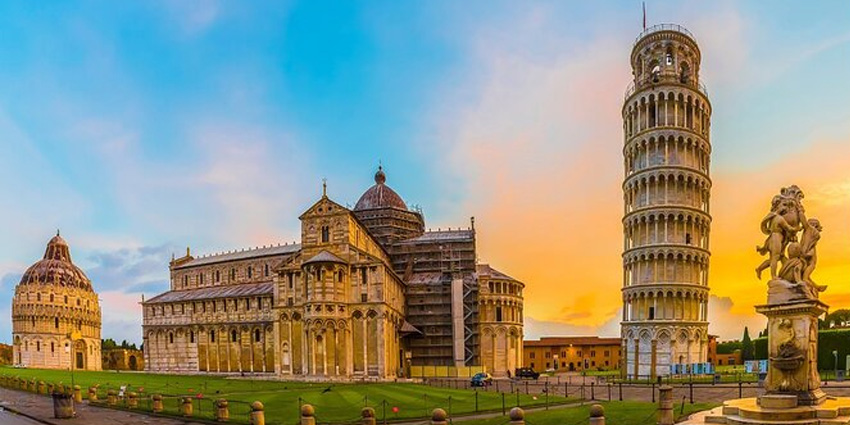
What to Do and See in Pisa: A Complete Guide to the City of the Leaning Tower
Pisa, located in the heart of Tuscany, is one of Italy’s most iconic destinations.
Known worldwide for its Leaning Tower, the city offers much more than its famous tilted monument. With a history that dates back to the Etruscans, Pisa flourished during the Middle Ages as a powerful maritime republic and today presents visitors with a unique combination of art, architecture, culture, and vibrant local traditions. Strolling through the historic center means immersing yourself in centuries of history, while discovering corners of authentic Italian daily life.
Piazza dei Miracoli: the Heart of Pisa
The city’s most famous landmark is Piazza del Duomo, universally known as Piazza dei Miracoli, a UNESCO World Heritage Site. This large green square is home to some of the most extraordinary examples of Romanesque architecture in Europe:
- The Leaning Tower of Pisa: perhaps the most photographed monument in Italy, it began to tilt shortly after its construction in the 12th century due to unstable ground. Its unique inclination makes it one of the most recognizable landmarks in the world.
- The Cathedral of Santa Maria Assunta: a masterpiece of Pisan Romanesque style, featuring a richly decorated façade and remarkable interiors with mosaics, marble columns, and artworks by renowned medieval masters.
- The Baptistery of San Giovanni: the largest baptistery in Italy, remarkable for its blend of Romanesque and Gothic styles and its exceptional acoustics.
- The Monumental Cemetery (Camposanto Monumentale): an evocative cloister that preserves medieval frescoes, sculptures, and ancient sarcophagi, offering a journey through centuries of art.
Exploring the Lungarni and the Historic Center
Beyond the celebrated Piazza dei Miracoli, Pisa invites exploration of its Lungarni, the elegant streets that run along the River Arno. These riverside avenues are lined with Renaissance palaces, churches, and historic buildings, offering picturesque views both by day and by night.
The historic center is equally fascinating, with its network of narrow streets, squares, and lively neighborhoods. One of the most remarkable sites is Piazza dei Cavalieri, once the political center of the medieval Republic of Pisa. Today, the square is dominated by the Palazzo della Carovana, redesigned by Giorgio Vasari, and houses the prestigious Scuola Normale Superiore, one of the most important academic institutions in Europe.
Museums and Cultural Heritage
For those who wish to deepen their understanding of Pisan art and history, the city boasts several important museums:
- The Museo dell’Opera del Duomo, which houses original sculptures, paintings, and treasures from the monuments of Piazza dei Miracoli.
- The National Museum of San Matteo, which contains one of the richest collections of medieval and Renaissance art in Tuscany, including works by Donatello, Masaccio, and Fra Angelico.
Pisa is also home to a vibrant cultural life, hosting festivals, concerts, and traditional events throughout the year. Among the most famous is the Luminara di San Ranieri, a June celebration during which the city is illuminated by thousands of candles along the Arno.
Green Spaces and Relaxation
In addition to its artistic treasures, Pisa offers quiet places where visitors can relax and enjoy nature. The Giardino Scotto, a park set within an old fortress, provides shade and tranquility just steps from the center. Another highlight is the Botanical Garden of Pisa, one of the oldest in Europe, founded in the 16th century by Cosimo I de’ Medici. Here, rare plants and centuries-old trees create an oasis of calm.
Excursions and Surroundings
Thanks to its strategic location, Pisa is an excellent starting point for exploring Tuscany. Just a short drive away, visitors can reach Marina di Pisa, a seaside town with promenades and beaches, ideal for a break by the sea. The nearby Pisan Hills are dotted with medieval villages, vineyards, and olive groves, offering opportunities to discover traditional Tuscan flavors and landscapes. Moreover, Pisa is well connected to other major cities such as Florence, Lucca, and Livorno, making it an ideal base for exploring the region.




